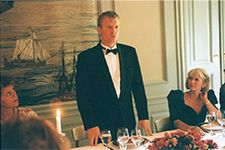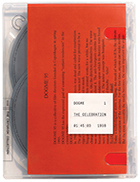The Celebration (Festen)
|  Along with Lars von Trier’s at-that-point-unseen The Idiots (Idioterne, 1998), The Celebration (Festen) was the first film to be made according to “The Vow of Chastity” (kyskhedsløfter), a strict submission to ten rules of filmmaking taken by the members of Dogme 95, a collective of Danish film directors founded in 1995. The directors, which also included at various points von Trier, Kristian Levring, Søren Kragh-Jacobsen, Jean-Marc Barr, and Harmony Korine, swore to “counter certain tendencies in film today,” meaning they would only shoot on location, incorporate only those props found at the location, only use natural sound, film with hand-held cameras, avoid any special effects or filters, shoot only in color, and so on and so forth. They also swore that the director would get no credit as an “auteur,” and genre films were strictly forbidden. On paper, the tenets of Dogme 95 are preposterous in their limitations (although their rationalization of giving balance to cinema by countering mega-budget Hollywood poductions is understandable). It is roughly the equivalent of allowing painters only the use of oil paints and a certain size canvas or demanding that writers refrain from using words beyond four syllables.Having said all that, it is not hard to imagine that I went into The Celebration already a bit jaded and cynical. And, for about the first 10 to 15 minutes, I was unimpressed and feeling more cynical than ever. But then, slowly but surely, Vinterberg’s dark family drama took hold of me. Tobias Wolff described a similar feeling when he wrote about his reaction to Raymond Carver’s short story “Cathedral.” Wolff wrote that there was no one specific moment in the story he could point to where his attitude suddenly changed; instead, it was like a hinge, coming onto him “by almost imperceptible degrees.” That is how The Celebration works. The film tells the story of the 60th birthday party for Helge Klingenfeldt (Henning Moritzen), a wealthy patriarch who invites dozens of friends and relatives to his family’s chateau hotel for a night of celebration. In the film’s opening scenes, we are introduced to the various family members as they arrive: the oldest son, Christian (Ulrich Thomsen), a thin, melancholy man who has not quite gotten over the recent suicide of his twin sister; Helene (Paprika Steen), his fast and loose younger sister who will shock everyone at the party by dating an English-speaking African-American; and the youngest brother, Michael (Thomas Bo Larsen), a loud, drunken lout who is almost refused admittance to the party due to his behavior at Helge’s birthday party the previous year. With the exception of a fight between Michael and his long-suffering wife, Mette (Helle Dolleris), over a pair of shoes that didn’t get packed, and Helene’s discovery of a mysterious note from her deceased sister that will come into play later in the film, the gathering is initially uneventful. That is, until Christian stands up to make a toast at the dinner table, and in the middle of his speech, drops a bombshell by (almost nonchalantly) accusing his father of something horrendous. Like civilized people do at social parties, the guests try to ignore the comments and go about their happy business. But later, Christian stands up again and accuses his father of something even more monstrous. When his mother, Elsa (Birthe Neumann), tries to smooth things over, Christian is even more direct and accusatory toward his father and calls her hypocritical for turning a blind eye. Helge retorts that Christian is sick in the mind—and maybe he is. Or, could he be telling the truth? The party gradually becomes more and more bizarre as various family members have skeletons pulled out of their closets. The question of whether or not Helge did what Christian accuses him of having done haunts all the proceedings. Nothing is quite right after that, and everything the guests do to ignore the disturbances makes the party that much more disturbing. The Celebration is certainly a bizarre film, and many will not take to it. The point of Dogme 95 is allow the truth to come out of a film’s characters, and it is in this aspect that Vinterberg’s effort meets with the most success. His characters are richly drawn, fascinating people who we loathe, pity, and fear. Because Christian, the accuser, is the calmest and most rational character in the film, he is also the most mysterious; his attitudes do not match with the party’s increasingly surreal atmosphere. It is almost too easy to write him off as deranged, but what might be taken for guilt gleaming in Helge’s eyes keep the question open until the end. On a technical level, The Celebration is quite extraordinary because Vinterberg shot the whole film on a consumer-grade Sony DCR-PC7 Mini DV Camcorder, which was small enough to fit in one’s hand. The video was then transferred to Dogme 95-mandated 35mm color film, and the result is a grainy, low-resolution frame that looks just slightly askew from what audiences were used to at the time. Vinterberg and cinematographer Anthony Dod Mantle, who at the time had shot primarily documentaries and would go on to win an Oscar for Danny Boyle’s Slumdog Millionaire (2007), make fine use of quick close-ups, odd angels, and swinging overhead shots and zooms that seem almost impossible for a hand-held camera. Interestingly enough, the most extraordinary scene in the film is one that is questionable by Dogme 95 standards. It is a poignant sequence that might be a dream or it might be real, where Christian meets face-to-face with the smiling ghost of his departed sister. Vinterberg films the scene in a series of quick cuts, all of which are lighted by a single candle, giving the scene an effective dream-like quality. It is also filmed in almost utter silence, so that all we hear is the hushed whispers of the characters and their breathing. The scene is so radically different from the rest of the film—even though it is beautifully foreshadowed early on—that it seems like it was imported from another movie. The Celebration has been described as a black comedy, but the laughs are hit and miss. It has some elements of farce (especially when the cook steals all the guests’ car keys so they can’t escape the party when it turns for the worst), and there are even some pratfalls (such as when Michael slips on a bar of soap in the bathroom), but there are no real laugh-out-loud moments. When Vinterberg does try some obviously intended comedic moments, such as when a senile grandfather stands up and gives the same bad-joke toast several times in a row, the results are mixed. Nevertheless, the film as a whole is an interesting experiment that works as a scathing, sometimes humorous drama whose mixed feelings are hard to shake off.
Copyright © 2022 James Kendrick Thoughts? E-mail James Kendrick All images copyright © The Criterion Collection | |||||||||||||||||||||||||||||
Overall Rating: 

 (3)
(3)


